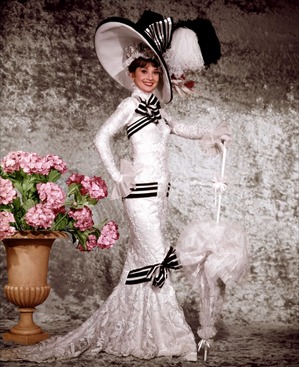Sing along with "My Fair Lady" at the Michigan Theater

Audrey Hepburn in "My Fair Lady"
Yes, there are occasional glimpses of Hepburn’s real voice in the song, “Just You Wait, Henry Higgins,” to name 1 example; but the actress herself estimated that 90 percent of her songs in the film were dubbed, and she remarked that if she’d known that so little of her vocals would be used, she wouldn’t have accepted the part. (Julie Andrews played the role to great acclaim, and a Tony Award nomination, in the stage version, but Jack L. Warner of Warner Brothers wanted a bankable movie star for the film version.)
PREVIEW |
You can certainly understand the role’s temptations, though. Based on George Bernard Shaw’s play “Pygmalion,” the stage musical — with book and lyrics by Alan Jay Lerner, and music by Frederick Loewe — was a celebrated hit in Britain and on Broadway.
Telling the story of a snobby linguist who, on a bet, sets out to make a poor, Cockney-speaking flower girl pass in London’s high society, “Lady” is only 1 of 4 shows to win both a Tony for best play/musical and an Academy Award for Best Picture; the others are “The Sound of Music,” “A Man for All Seasons,” and “Amadeus.”
Want more “Lady” trivia to gear up for Sunday's sing-along screening —Â where you'll get to sing everyone's part, not just Eliza's?
• Though most people know Hepburn’s singing was dubbed, Jeremy Brett, who plays Eliza’s suitor Freddy Eynsford-Hill, had his vocals dubbed, too (by American Bill Shirley), despite being a strong singer. Brett — who went on to play Sherlock Holmes in a British television series years later — was 30 at the time of filming, though Freddy is supposed to be 20. This was deliberate, however, since Hepburn was 34, and Eliza is supposed to be only 21.• Richard Rodgers and Oscar Hammerstein II tried to tackle Shaw’s “Pygmalion” in order to make it a stage musical, too — long before Lerner and Loewe did — but gave up partly because of the difficulty posed by the emotionless character of Henry Higgins. Lerner and Loewe solved this problem by writing the role specifically for a strong actor, Rex Harrison, and by adopting the idea that Higgins would talk on pitch rather than sing, thereby conveying ideas more than emotions.
• Because Harrison “spoke” his lyrics, he couldn’t pre-record his songs and then lip-sync on set. For this reason, a wireless microphone (one of the first used in film) was hidden beneath his tie, but then another problem emerged: his vocals were perfectly synchronized to his facial movements, while everyone else’s were a little off. The studio consequently altered his tracks slightly so he would appear to match his co-stars.
• “I’ve Grown Accustomed to Her Face” held special meaning for Harrison, according to a biographer. During “Lady”’s original Broadway run, Harrison would sing the song to his third wife, Kay Kendall, who would watch his performance from the wings, and during the filming of the number — when Kendall had died a few years before from leukemia — Harrison thought of her.
• After shooting “Wouldn’t it Be Loverly” on the Covent Garden set, Hepburn had the sad task of announcing John F. Kennedy’s assassination to the film’s cast and crew on November 22, 1963.
• We always hear about Julie Andrews being passed over for the film version of “Lady,” but two actresses who were lobbying behind-the-scenes were Elizabeth Taylor and Connie Stevens (while Jack Warner was reportedly considering Shirley Jones for the role).
• Look closely at the paper Eliza holds while practicing her H’s in front of a spinning mirror; when the paper catches fire, you can spot a line of the scene’s dialogue, hand-written: “Of course, you can’t expect her to get it right the first time.”
• It’s popular to dump on Disney, but you can’t blame the mouse for Andrews’ absence from the film version of “Lady.” Disney offered to delay filming on “Mary Poppins” until the summer of 1964 if Andrews got the call to play Eliza, but of course, she never did. So Andrews went on to star in a little Rodgers and Hammerstein musical called “The Sound of Music” the following year — ironically, taking the place of the Tony Award-winning star of that show, Mary Martin.
Here's a short about the film's creation; you'll note how sure everyone sounds about casting choices...
Jenn McKee is the entertainment digital journalist for AnnArbor.com. Reach her at jennmckee@annarbor.com or 734-623-2546, and follow her on Twitter @jennmckee.

